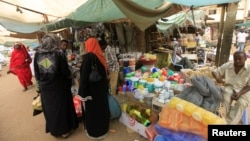A 20-percent spike in maize and wheat prices in just the past three weeks is raising concerns with the United Nations Food and Agriculture Organization (FAO).
FAO economist Shukri Ahmed said the increase in price was sharp and sudden. He said that until May, experts were hoping for a huge increase in worldwide maize production.
The FAO Global Information and Early Warning System issued a bulletin Friday saying that drought in the United States is helping push up prices, while hot, dry weather in the Black Sea region is affecting wheat.
Ahmed says the price increase will put pressure on national budgets in countries that depend on imports for their domestic food needs.
"Northern African countries, Middle Eastern countries, some countries even in Asia and Africa who actually depend for more than 30 to 70 percent of their consumption needs on imports," said Ahmed.
Add the threat of rising food prices to the list of troubles in Syria.
"Near Eastern countries, whether it is Iraq or Syria or others, actually import from the international market. So, if these prices persist as they are, it will have implications on the countries that import much," said Ahmed.
Ahmed said that price increases will strain national budgets in countries that depend on imported grain, forcing them to make difficult choices.
FAO economist Shukri Ahmed said the increase in price was sharp and sudden. He said that until May, experts were hoping for a huge increase in worldwide maize production.
The FAO Global Information and Early Warning System issued a bulletin Friday saying that drought in the United States is helping push up prices, while hot, dry weather in the Black Sea region is affecting wheat.
Ahmed says the price increase will put pressure on national budgets in countries that depend on imports for their domestic food needs.
"Northern African countries, Middle Eastern countries, some countries even in Asia and Africa who actually depend for more than 30 to 70 percent of their consumption needs on imports," said Ahmed.
Add the threat of rising food prices to the list of troubles in Syria.
"Near Eastern countries, whether it is Iraq or Syria or others, actually import from the international market. So, if these prices persist as they are, it will have implications on the countries that import much," said Ahmed.
Ahmed said that price increases will strain national budgets in countries that depend on imported grain, forcing them to make difficult choices.





